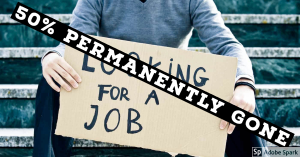I have continued to warn about the effects of COVID-19 on the job market, that right now millions of people are in danger of losing their livelihoods, and if patterns continue as they have been, more job losses are imminent that will create a sort of ‘ripple effect’ and will bring about more of the same decline.
According to USA Today, a new study shows that half of the jobs lost during the COVID-19 first wave of shutdowns are not coming back, meaning they are permanent.
The COVID-19 outbreak has clearly done a number of the U.S. economy, plunging it deep into a recession and sending unemployment levels skyrocketing. In fact, jobless claims reached a record high in April, and while things improved slightly in May and June, new restrictions could send the unemployment rate even higher in the coming months.
Unfortunately, rising joblessness could coincide with the end of the $600 weekly unemployment boost that’s been keeping millions of Americans afloat these past few months. That $600 boost, which March’s CARES Act provided for, expires at the end of July, but because of the way states pay their unemployment benefits on a weekly cycle, for most jobless folks, it’s actually already gone.
Meanwhile, lawmakers are gearing up to present a new stimulus package to provide ongoing relief during the COVID-19 crisis, and extended unemployment is a big part of it. But a continuation of that $600 boost in unlikely to happen. In fact, Treasury Secretary Steven Mnuchin has already come out and said that boosted unemployment will, going forward, amount to more like an extra $188 to $310 per week.
Why not extend the full $600? Lawmakers say it’s a deterrent for workers to return to a job, since with it, some out-of-work Americans make more money on unemployment than they do in an employment capacity. But another argument against that boost is that the jobless claims we’re seeing right now represent a temporary problem – one that’s likely to go away once the COVID-19 outbreak wanes or an effective vaccine is made widely available.
Of course, everyone wants the current unemployment crisis to be temporary. But new data reveals that a frightening number of jobless Americans may not, in fact, have a role to return to once the pandemic ends.
In April, 78% of those in households experiencing job loss felt that that situation would be temporarily. But now, 47% think that job loss is likely to be permanent, according to The Associated Press-NORC Center for Public Affairs Research. All told, roughly 10 million workers might need to find a new employer after the pandemic wraps up, and some might need to switch gears and find a new profession altogether. (source)
I have been warning before and I will warn again, this is just the beginning of a major crisis that will get worse as the years go on.
The US is actively in a depression right now. Millions of people are out of work, and with the declining pool of available work and the expanding pool of people searching for work, there is not enough work to go around for all, and what work exists is dropping in pay rate either due to employers lowering pay due to an abundance of workers (the supply versus demand side) and then due to the declining value of the currency through money printing.
Each round of “stimulus” the government prints does nothing except to drive down the value of the dollar towards that of the paper it is printed on, which is nothing, and would likely manifest in the form of hyperinflation.
I have said before and I will say it again, if you are able to, work as much as possible, save as much as one can, and then also spend on provisions for the future because it is very uncertain as to what will happen at the current moment save for more of the same.
There is likely going to be a second round of COVID-19 layoffs in the future based on current trends. Hopefully those will change, but at the current time, especially when the fall comes around, people should be prepared for a repeat of what happened earlier this year, except this time with more shortages, more job losses, and less patience.
This is not the time to be scared, sad, or to sit back on one’s backside, but to get up and get working, preparing for what is likely to come and even if it does not, given the general economic and social decline that is taking place right now, for another crisis of a similar degree of seriousness that will worsen the already poor state of economic affairs.
Get working, because time is passing away.



